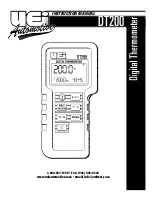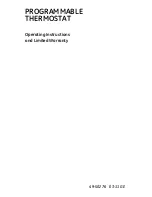
Maintenance
Cleaning
Use a damp cloth and mild soap to clean the case of your DT200.
DO
NOT
use harsh detergents or abrasives as these may mar the finish or
damage your unit’s case with an adverse chemical reaction.
DO NOT
allow moisture to directly contact the thermocouple ports, or
enter the instrument’s housing. Remove the instrument from its boot to
ensure moisture is not trapped during cleaning.
Replacing the Battery
Replace your 9 volt alkaline battery when:
• The BAT icon appears on the right side of the LCD
• The instrument will not power on
• Use of the back-light causes the BAT icon to appear
Even if the battery was recently replaced, check its voltage level if
you get no response from your instrument. Remove batteries from
instruments that you do not plan to use for a month or more.
DO NOT
leave batteries in instruments that may be exposed to
temperature extremes.
Dispose of batteries in acco rd a n ce with local land use re g u l a t i o n s
To replace the batteries:
1. Remove the thermocouples from the top of the instrument
2. Remove the rubber boot, by sliding the instrument out toward
the top faceplate cut-out
3. Lay the instrument face down on a clean, flat surface
4. Remove the battery cover
• Apply inward pressure on the side of the battery cover at
the recessed point, toward the slit, while lifting it out
5. Remove and replace the battery, observing indicated polarity
Calibration
When properly maintained, your DT200 will maintain an accuracy
specification of up to 0.1% of the reading. To ensure your instrument
is performing at its peak, send it to the UEi factory or a qualified
instrument calibration facility for annual calibration.
Troubleshooting
This instrument contains no user serviceable parts beyond those listed
in the troubleshooting table. In the event your instrument is physically
damaged or does not function properly after taking the listed action,
please return the instrument to UEi following the warranty and
service instructions.
Troubleshooting Fault Table
Specifications
Operating Conditions
32 to 122˚F (0 to 50˚C) at 0 to 85% relative humidity (non-condensing)
T1-T2 Measurement, accuracy
±(0.2% T1-T2 r 1.7˚C) or
±(0.2% T1-T2 r 3.4˚F)
Ambient Coefficient
0 - 18˚C and 28 - 50˚C (Ambient temperatures) For each ˚C ambient
below 18˚C or above 28˚C, add the following tolerance into the accuracy
spec: 0.01% of r0.03˚C (0.01% of r0.06˚F)
If I see this
malfunction
Instrument does
not turn on
Dashes appear in
T1 and T2 data
screens
Dashes appear in
T1 and/or T2 data
screens with
thermocouples
inserted
Temperature drifts
from known value
in a controlled
environment
Relative clock will not
start when RECORD
button is pressed
Dashes appear
during review of
maximum
recorded value
Data continues to
update when
HOLD or
RECORD are
invoked
Instrument turns off
during recording
I should
check for
Battery
voltage
battery
installation
Thermocouples
Thermocouple
continuity
Thermocouple
connection
Thermocouple type
Moisture, corrosion
or debris on
thermocouple
Defective
thermocouple
Thermocouples
properly inserted
Open thermocouple
Proper operation
Hold/Record
is not being
fully pressed
Auto power
off defeat
Then take this corrective
action
Replace low battery
Ensure clip grips battery
posts tightly
Insert missing thermocouples
Measure resistance of
thermocouples to ensure they
are not broken internally -
Replace if required
Clean corrosion or debris
off of thermocouple - Reinsert
Ensure thermocouple type
matches the displayed icon
Clean and dry thermocouple
blades - Allow thermocouple
plug to air dry
Confirm defect with known
good thermocouple -
Replace if required
Record will not start without
thermocouples inserted
Check for intermittent or
momentarily removed
thermocouple
Hold and Record affect the
Primary screen of info only
Observe HOLD or REC icons
on LCD - Press button firmly
Follow procedures outlined
in operating instructions
DT200-MAN
P. 3
























